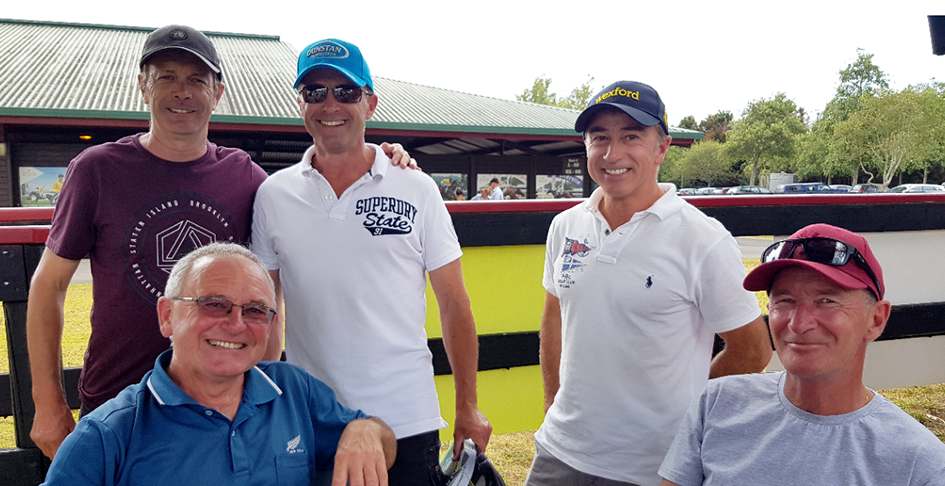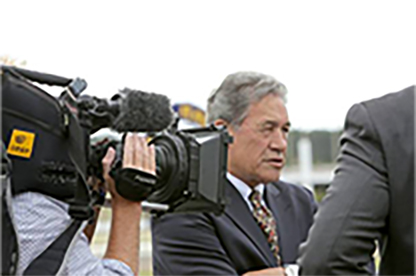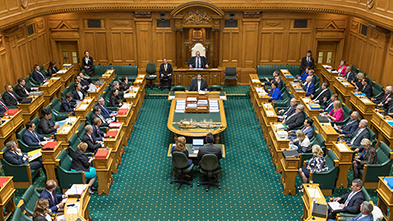At Karaka 2020: the industry’s ex-jockeys now trainers who would love to see a rise in NZ prizemoney: From top left Stephen McKee (one trial ride), Graham Richardson (one race win), Lance O’Sullivan (Champion Jockey), Bob Vance (Outstanding Jockey) and at right Grant Cooksley (outstanding Jockey)
by Brian de Lore
Published 31 January 2020
When Racing Minister Winston Peters made his speech to open the Karaka Yearling Sales last Sunday at 10.50 AM, it was a typically hot and humid Auckland summer’s morning in rising temperatures.
But within seconds of commencement of that speech, The Optimist blog was the focus of the Minister’s attention and the heat went up to furnace temperatures.
However well researched you are as a blogger, if you generate an opinion from that research and then put your name to it and publish it, your readership can form into categories ranging from avid fans to ardent enemies.
Only a day or two before in a conversation with Cambridge Stud owner Brendan Lindsay, it was suggested The Optimist had been a bit tough on the Minister in recent times in suggesting he had dropped the ball and was missing in action; citing the examples of Winston’s recent appearance at Trentham and his commitment to attend the Karaka Millions meeting and open Karaka 2020. The feedback was good.
We all know that the Hon. Winston Peters is not only Minister of Racing, but is deputy Prime Minister and often acting PM, and has three more significant portfolios above racing in Foreign Affairs, State-Owned Enterprises and Disarmament and Arms Control. The average Kiwi might suggest racing is trailing in a long last in priority – another one we have to concede.
On the other hand, sometimes the bird won’t fly unless you ruffle the feathers. The Optimist has no intended agenda other than to point out the glaring problems of the racing industry, and by doing so hopefully generate a groundswell of support to make changes for the betterment of the participants, to keep it sustainable and to achieve change in the fastest possible time – I make no apology for that – but neither am I pretending I have all the answers.
…the only bad publicity you can get is the publication of your obituary…
Going on the old saying that the only bad publicity you can get is the publication of your obituary, I decided that the best course of action would be try and get the Minister back on the phone after a hiatus of nine months. However unlikely the chances seemed, it was worth a shot, and enlisting the help of NZ-First list MP Clayton Mitchell, on Wednesday of this past week, the agreement finally came in the form of a text.
From the outset, any sign of dropping the ball was gone; the demeanour coming down the phone line was saying I had been watching the wrong footy match, and here was a focused Winston Peters crashing through a pack of DIA forwards for a try under the goalposts and a seven-pointer.
The Minister on the phone exuded an air of positivity. I firstly asked about that meeting: “One of the things I talked to John Messara about was the question of industry involvement in its future management and when I said that we are setting out to ensure they control their own destiny – I meant exactly that.
“And there are parts of the legislation that we have looked hard at for a month now – in treating a range of those issues so to remove the possibility of a conflict with the industry’s sanctuary involvement going into the future. The secret is not to duplicate, though, what happened post-2003 with that legislation, because it’s clear that – the way it was constructed – it did not have the skills of the industry foremost in the provisions going forward – we have to fix that up.
“…the biggest legislation fix is the ministerial report summating what Messara said because there are points in there, which I can say, this draft does not reflect – and we’re going back to that original report”
“And we’re going to ensure that the biggest legislation fix is the ministerial report summating what Messara said,” continued Winston, “because there are points in there, which I can say, this draft does not reflect – and we’re going back to that original report.”
Suggesting to Winston this promise would be music to the industry’s ears, I then ventured into the controversy on the Intellectual Property.
“Now what happens is that the IP – the legislation improperly reflects what we were seeking. We’re not seeking to take anything from any industry at all. That’s another thing we want to fix up.
“The third one was on the clubs and venues going forward,” said Winston. Again, we are saying to the industry, it’s over to you to decide about the continuance and viability of race tracks and clubs, but amalgamation or combining with other race clubs will see them in a far more helpful situation where they don’t have to rely on central core funding for operational support.”
What can you do to ensure that we have strong industry representation on the board of TAB NZ, I asked.
“There is a range of structures to go in to ensure that the industry stays in control, but it requires the industry to appoint and nominate their best – and not just your mate. We want the best of them at the top, allied to Tabcorp – not just my mate ‘let’s put him on’ – that’s no good.
“All I can do is put a structure in place and put a criterion alongside it to ensure we do get the best people” – Winston Peters
“All I can do is put a structure in place and put a criterion alongside it to ensure we do get the best people,” the Minister emphasised strongly. “So that’s what’s being worked on – in fact, I have a team working on this and the amendments as we speak, and we hope to have that ready for the closure time of submissions on February 11th. When we have all the submissions in, then we can quickly dossier it in, and as John Messara said, it’s a matter of the correct messaging and tweaking the words to reflect the spirit and the objectives of his report in the first place, and I agree with him entirely.
“I’m here to listen,” retorted Winston to my suggesting the feeling was that thoroughbred racing code felt they had needed more consultation on these issues. “I’m not here to ram something down people’s throats and if they think that the drafting does not reflect their intent, then we’re here to listen to them and ensure that it does.”
When I remarked to Winston that the issue of who owned the TAB had raised its head once again, he said: “Here we are in 2020 and the industry doesn’t know the answer as to who owns the TAB. Is it foremost in my mind, but I wouldn’t want to report on it now because it makes far more sense for me to wait and see all the submissions and then address that issue.”
My next question on the codes brought this response: “I have just been through the annual report for the dogs; we have trotting in a serious plight and that’s two out of three. I’ve also got to ensure the integrity unit is bolstered as well, and all these things have to be balanced out. What I’m seeking to do is have, by the end of this budget round, and to get through parliament, all the structures that we can go forward on in the spirit of the Messara Report which after all, is very similar to the McCarthy Report of 1965.
“…spend $42 million getting this betting system going – this is an appalling situation to inherit.” – Winston Peters
“In 2008 racing had something like $130 million in reserve and then they spend $42 million getting this betting system going – this is an appalling situation to inherit. However, looking at what can be done alongside other breeding industries in New Zealand such as cattle and sheep – I just want the same kudos for the racing industry.
“All I can do is ensure that we have the legislative structure and the criteria in it to bring out the very best of the industry and have it central to any decision making, but I do not want to see another situation which I encountered in 2005 when I became the Racing Minister – and had a good hard look at who was giving all the advice, and I was alarmed at that time, and I was still alarmed when I came in again in 2017.
“We’ve gone back to first principles and that’s why I got the Messara Report done, and I’m going to nurse this through parliament – and get it through I will.”
“We’ve gone back to first principles and that’s why I got the Messara Report done, and I’m going to nurse this through parliament – and get it through I will.”
On the subject of the submissions and how much weight they carry, Winston responded thus: You have to see the submissions first, you never know who might have a really bad idea. And I’m bound to follow the process and give them the respect they deserve.
“I wouldn’t advise you to tell your readership to trust the process entirely,” he continued. “You should more properly say that it’s the international examples of success they should go by, and the present powers that be, will respect and listen and draft what has to come, and clearly understand what we need to do.
“We’ve got an industry that is barely $1.6 billion and has been there for 12 years at the same level according to what I have read, while Ireland for the gallops alone is an industry worth $3.2 billion – that’s what we are setting out to do.
” …serious pathway in the future for many young people who all they want to do is work with horses…” – Winston Peters
“We’re going to do an exercise on what the industry is actually worth, and then make sure that the political system understands that racing is a huge employment creator and it’s a huge provincial boost to economic welfare and is a serious pathway in the future for many young people, who all they want to do is work with horses bearing in mind that the number one person is the owner, and then the punter.”
Winston concluded by saying: “I meant what I said at the Karaka Sales opening; there’s never been a better time to buy into the industry than right now; I’m very confident to where we are going in the future, and if all things go well in the 2020 election as we intend them to, we can do so much more.”
Postscript Interview with John Messara AM during his four-day visit to attend the Karaka Sales this past week:
John Messara Q&A
Racing Minister Winston Peters has reassured the industry this week that it will get the legislative change to fix the problems by the end of June. What would be the impact of getting this second Bill through in an acceptable form?
The first thing that would happen upon the passing of the Bill is a sense of relief, then confidence would return among thoroughbred industry stakeholders who have been so resilient for so long, and who will respond quickly when they see the legislation deliver genuine major reform.
Once the Bill is passed into law, what in your view should happen immediately afterwards?
I believe that a ‘war cabinet’ of pragmatic industry leaders should be established to execute the major financial imperatives, beginning with the process leading to the possible joint venturing of the TAB operations.
What else would you do as a matter of priority?
The next thing would
be to execute the new governance arrangements, including the selection of new
boards based on the NSW model, so that the detailed reform process can begin.
If all that was seen to
be done, I think there would be a mini-boom in the industry, led by New Zealand
and Australian investors, followed by Asian investment.
Arrowfield Stud was the leading vendor on aggregate at the
recent Magic Millions Gold Coast Sale, and you were an observer this week for
Book One of our National Yearling Sale at Karaka. How would you compare the two
sales?
My team at Arrowfield and I are
always analysing yearling sale statistics, and this year’s comparison of the
Magic Millions with Karaka Book One shows how far the New Zealand industry has
fallen.
Only three of the top 25 sale prices this year at Karaka and Magic Millions combined were achieved at Karaka – and none of the top15. Also, only two of the top 25 yearling sale prices at Karaka and Magic Millions have been achieved by the progeny of a New Zealand-based sire – and none of the top 18.
Then, looking at
the dams: only three of the top 25 yearling sale prices registered so far this
year have been paid for the progeny of New Zealand-bred mares – and none of the
top six.
Looking at the first day of Book 2 at Karaka, a $34,000 average simply doesn’t
represent a return for most breeders and vendors, including the private,
small-scale operations that have produced many of New Zealand’s very best
horses in the past.
This is not a failure of the sales company which has worked tirelessly to sustain and enhance the Karaka Sale. The reason for these results is that New Zealand breeders have not had the encouragement or the returns on their investment required to upgrade the national gene pool over the last twenty years of industry decline. However, I believe this can change quite quickly.
How do we turn that decline around even with the advent of acceptable legislation?
I expect that in
anticipation of a racing industry upturn, breeders and owners would start to
re-invest in mares, stallions and young horses soon after appropriate
legislation is passed. Overseas investors will also look again at New Zealand
as an attractive place to set up a breeding or racing operation. This will
start the process, which would then feed on itself as the reforms take effect.
Remember, historically, NZ has been a great horse racing and breeding nation,
and the National Yearling Sale was the No. 1 sale in Australasia.
I recall the late Colin Hayes lobbying the
then Australian Prime Minister, Bob Hawke in 1985, to amend the Australian Tax
Act to “enable Australia to compete with NZ” in racing and breeding. I have a
vivid memory of this as I was the person who wrote and presented the submission
to Treasury! This and other reforms in Australia set that industry on the path
to major recovery and success.
In an ideal world that
would begin in July with everything you have outlined above, how long will it
take for the financial benefits to impact on the industry?
I believe that the joint venturing of the TAB (which I emphasise does not
require the sale of the TAB in any shape or form), the sale of surplus
property and the suite of other changes including those introduced in the first
Act, will have a positive and immediate impact on industry morale, and
ultimately viability. The industry’s leadership should be able to negotiate and
execute much of this, including increased prizemoney, within a two-year time-frame
from the passing of the second Act, underpinning the upturn ; and then the
upgrading of tracks and facilities etc. would begin in earnest.
Back in July 2018 when I delivered my Report to the Minister, I was excited by
the future ahead of the New Zealand industry, because the necessary reforms
were clear to me and my colleagues, and so achievable. Today, I am encouraged after
chatting with Mr. Peters’ last week that he will make it all happen and after
that we’ll be relying on the work of those appointed to leadership roles.



